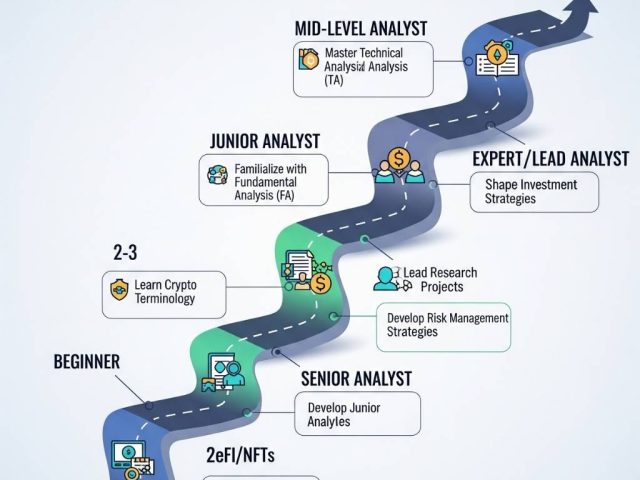The Crypto Craze: Navigating a Sea of Information
The cryptocurrency market has experienced explosive growth in recent years. This influx of new investors has led to a surge in information, including research reports, analysis, and social media chatter. While this abundance of data might seem empowering, it can also be overwhelming for investors seeking reliable guidance.
Why Research Methodology Matters
In the fast-paced world of cryptocurrency, conducting thorough due diligence is paramount. Investors who rely solely on hype or celebrity endorsements risk making uninformed decisions that could lead to significant financial losses. A strong research methodology provides a framework for analyzing projects, identifying potential risks, and uncovering valuable insights to guide investment choices.
Key Components of a Reputable Research Methodology
-
Fundamental Analysis: A comprehensive research methodology should begin with a deep dive into the project’s fundamentals. This includes examining the project’s whitepaper, roadmap, and tokenomics. The whitepaper should outline the project’s purpose, technology stack, and development goals. A well-defined roadmap demonstrates a clear vision for the project’s future, while robust tokenomics ensure a sustainable economic model.
-
Team Analysis: The team behind a cryptocurrency project plays a crucial role in its success. Investors should scrutinize the team’s experience and expertise in blockchain technology, finance, and relevant industries. A team with a proven track record and a strong reputation inspires confidence in the project’s long-term viability.
-
Technical Analysis: For blockchain-based projects, evaluating the underlying technology is essential. This involves assessing the project’s consensus mechanism (e.g., Proof-of-Work, Proof-of-Stake), scalability potential, and smart contract security. A robust and secure blockchain infrastructure forms the foundation for a reliable and trustworthy project.
-
Market Analysis: No cryptocurrency project exists in a vacuum. A comprehensive research methodology should consider the broader market context. This includes analyzing competitor landscape, identifying potential regulatory hurdles, and assessing the overall market sentiment towards the project’s niche or category. Understanding the competitive landscape helps investors gauge the project’s potential for differentiation and market share.
-
Transparency and Source Verification: Reputable research should be transparent about its methodology and data sources. Investors should be able to identify the research team’s qualifications and potential conflicts of interest. Additionally, research reports should cite verifiable sources to ensure the accuracy and credibility of the information presented.
Beyond the Methodology: Additional Considerations
A strong research methodology is a vital starting point, but it’s not the only factor to consider. Investors should also be mindful of:
-
Community Engagement: A vibrant and engaged community can be a positive indicator of a project’s long-term potential. Active participation in project forums and social media channels allows investors to gauge user sentiment and identify potential red flags.
-
Project Updates and Development Progress: Regular communication from the development team regarding project updates and progress is essential. Investors should monitor the project’s official channels to stay informed about key milestones and potential challenges.
-
Independent Verification: While research reports offer valuable insights, it’s crucial to conduct your own research to corroborate the information presented. Utilize alternative sources, such as developer interviews, community discussions, and industry publications.
By following these steps and conducting a thorough evaluation of the research methodology and additional factors, investors can make informed decisions in the dynamic and ever-evolving world of cryptocurrency.
Putting It All Together: Identifying Reputable Research Sources
Now that you understand the key components of a strong research methodology, you’re equipped to identify reliable sources of information in the crypto space. Here are some pointers to guide you:
-
Established Research Firms: Look for research firms with a proven track record in the blockchain and cryptocurrency industry. These firms often employ experienced analysts with expertise in financial markets and blockchain technology. Reputable research firms typically adhere to rigorous research methodologies and maintain transparency about their processes.
-
Independent Analysts: Independent analysts can offer valuable insights, particularly for niche projects or emerging sectors within the crypto market. However, it’s crucial to assess the analyst’s credentials and experience before relying solely on their research. Look for analysts with a strong reputation for objectivity and a history of accurate analysis.
-
Media Outlets: Several established financial news outlets and blockchain-focused publications feature cryptocurrency research and analysis. Look for publications with a commitment to journalistic integrity and fact-checking. Consider the outlet’s editorial stance and potential biases when evaluating their research content.
Red Flags to Watch Out For
While a strong research methodology is a hallmark of reliable information, certain red flags can signal potential biases or misleading information. Here’s what to be wary of:
-
Unrealistic Promises and Guaranteed Returns: The cryptocurrency market is inherently volatile, and any research report promising guaranteed returns should be viewed with extreme skepticism.
-
Excessive Hype and Unsubstantiated Claims: Research reports that rely heavily on hype and emotional language without concrete evidence to support their claims are likely biased or unreliable.
-
Lack of Transparency or Source Verification: Research reports that fail to disclose the research team’s qualifications, methodologies, or data sources should be avoided. Reliable research is transparent and allows investors to verify the information presented.
-
Conflicts of Interest: Be mindful of potential conflicts of interest. Some research firms might have financial ties to the projects they analyze, which could influence their objectivity. Look for research reports that disclose any potential conflicts.
By familiarizing yourself with these red flags and prioritizing research that adheres to a strong methodology, you can navigate the vast landscape of cryptocurrency research with greater confidence.
Conclusion
The ever-evolving world of cryptocurrency can be daunting for new investors. A plethora of information, research reports, and social media chatter can make it challenging to separate fact from fiction. However, by prioritizing a structured approach to research methodology, you can gain valuable insights and make informed investment decisions.
Remember, a strong research methodology should delve into a project’s fundamentals, team expertise, underlying technology, and market context. Look for research that is transparent, cites verifiable sources, and avoids unrealistic promises or unsubstantiated claims.
By following these guidelines and conducting your own due diligence, you can navigate the crypto research landscape with greater confidence and position yourself for success in this dynamic and exciting market.
FAQs
Is there a single “best” source for cryptocurrency research?
There isn’t a one-size-fits-all answer. A well-rounded approach involves consulting research from various sources, including established firms, independent analysts, and reputable media outlets.
How often should I revisit my cryptocurrency research?
The cryptocurrency market is constantly evolving. Regularly revisit your research and stay updated on project developments, industry news, and regulatory changes.
What if I don’t have the time to conduct my own research?
Consider subscribing to research reports from reputable firms or seeking guidance from a qualified financial advisor specializing in cryptocurrencies. However, remember that the ultimate responsibility for your investment decisions lies with you.
What are some additional resources for learning about cryptocurrency research methodology?
Several online courses and educational platforms offer in-depth tutorials on cryptocurrency research methodologies. Look for resources from reputable institutions or blockchain industry experts.
How can I stay informed about the latest trends in cryptocurrency research?
Follow industry publications, attend blockchain conferences, and connect with other cryptocurrency enthusiasts to stay abreast of evolving research methodologies and best practices.





